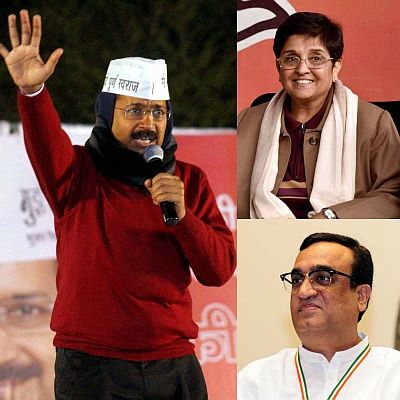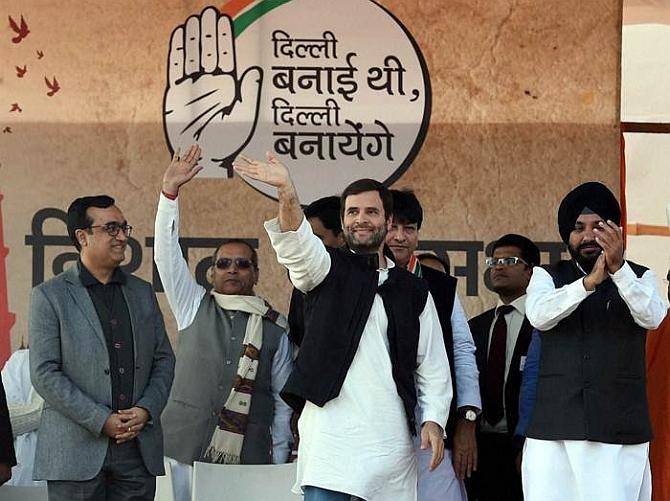 With the curtain coming down on campaigning in Delhi at 5pm on Thursday, who should be adjudged the Man (or Woman) of the Match?
With the curtain coming down on campaigning in Delhi at 5pm on Thursday, who should be adjudged the Man (or Woman) of the Match?
In the most hard-fought election for the national capital ever, the campaign saw thrills, spills and new twists every few days. Unlike its high-octane campaign in the past, initially, the Aam Aadmi Party was so quiet as to be almost subterranean. There were some major departures.
In the past election, AAP nominations were given after a virtual referendum on the candidates. Background checks were done rigorously, and publicly. This time, candidates were selected almost capriciously, to the point where most of AAP leader Prashant Bhushan’s nominees were dropped. Money laundering charges cropped up at the fag end of the campaign.
Liquor was apprehended at another AAP candidate’s campaign. The kind of candidates AAP fielded reflected the nature of the campaign. The language and polemic were localised and pointed. AAP did not pretend to see itself as a global body with a view on everything on earth.
Rakhi Birla (Mongolpuri), one of the few MLAs who is contesting again, had to answer tough questions about whether AAP would run away -- again.
Arvind Kejriwal had to apologise for resigning after 49 days, but people sat through the rain to listen to him at several places.
The party launched a unique ‘buzz’ campaign: young members of the party congregated in Delhi to campaign at metro stations, outside shopping malls, etc. AAP lost more people -- mostly to the Bharatiya Janata Party -- than to any other party, the foremost being Kiran Bedi.
Whether it was former Speaker of the Assembly M S Dhir or Shazia Ilmi (who livened the BJP campaign by relating stories of the centralisation of decision-making in AAP and the domineering by its senior leadership) or other junior leaders, it could be argued that the AAP narrative stayed alive and spoke via the BJP campaign.
AAP’s campaign was unequivocally about class.
Kejriwal spoke of the dislocation of slums from Rang Pahari, about access to education and the end of extortion by the police. 
The BJP’s campaign by contrast, was very much in the style and content of a ruling party in power, where the US presidential visit was invoked as part of India’s new aspiration and machismo.
The drafting of Bedi failed to cap squabbles within the party. Bedi had to make do with one loyal lieutenant — Sanjay Kaul —
The height of Bedi’s human resources problems was the resignation of one of her aides, who eventually returned; but the damage had been done. The result was, none other than party chief Amit Shah having to chide workers, telling them the party’s prestige was at stake, so they needed to work harder towards victory.
Urban Development Minister Venkaiah Naidu’s throwaway remark that the result of the Delhi assembly elections was not a referendum on Narendra Modi’s prime ministership suggests the BJP fears the worst.
All this has resulted in glossy pamphlets, posters, five questions every day, etc, but the worker is uninterested.

The Congress is yet to recover from the 2014 setback and has resorted to consolidating its resources. Knowing that the popular mood continued to be against it, it has focused on 25 seats where it is in the fight, say the strategists.
Its aim is to retain its existing eight seats and, in the best scenario, double that figure.
Instead of stressing on big rallies, the strategy has been to address small groups with more direct personal appeal to voters. So, Congress chief ministers and leaders from states have been pressed into service to address regional pockets -- Ramesh Chennithala and Oommen Chandy to address Malayalis, Harish Rawat to address migrants from Uttaranchal, while E V K S Elangovan, the Tamil Nadu party chief has addressed Tamil clusters in the capital.
Large rallies have been restricted to just one for party president Sonia Gandhi and three for Rahul Gandhi, apart from road shows. 45 to 50 public meetings a day has been the norm for the party with newly appointed general secretary in charge of Delhi PC Chacko personally co-ordinating the efforts.
It has only been Congress campaign committee chief and Sadar Bazar candidate Ajay Maken who has actively taken to social media to campaign. The party overall has not been able to harness social media space.
Arvinder Singh Lovely, the state chief, stepped down from contesting to focus on consolidating a depleted party. And till the end, Rahul Gandhi was defensive, protecting himself from the attacks of his colleagues like Jayanthi Natarajan, rather than hitting out at AAP.
Whoever wins the election, the campaign tells us it is Delhi's underclass that holds the aces: the dispossessed of Delhi cropped up repeatedly in the rhetoric. This is the constituency, with its new sense ofentitlement, that the new government will have to satisfy.











